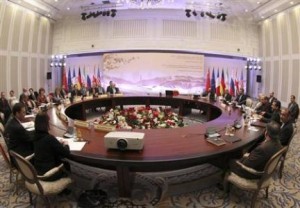 Like Iran's nuclear program itself, the international effort to stop it is about to enter a critical phase. Put simply, it now seems possible that the world will know by the end of April whether diplomacy will be sufficient to halt what some fear is an Iranian march toward nuclear-weapons capability.
Like Iran's nuclear program itself, the international effort to stop it is about to enter a critical phase. Put simply, it now seems possible that the world will know by the end of April whether diplomacy will be sufficient to halt what some fear is an Iranian march toward nuclear-weapons capability.Iran continues to enrich uranium at two facilities, and it is working on a separate heavy-water reactor that would be able to produce plutonium. Perhaps most troubling, it said this month it is building 3,000 new and faster centrifuges that would allow it to speed up its production of enriched uranium.
Meanwhile, diplomats from the U.S. and five allies held two days of talks at the end of February with Iranian officials in Kazakhstan in an effort to find a formula for slowing down the Iranian effort.
Lower-level nuclear experts from Iran and those world powers are set to meet Monday for more detailed discussions, and the high-level diplomats plan to get together again in early April.
In the midst of that action, President Barack Obama will visit Israel next week for talks with Prime Minister Benjamin Netanyahu that undoubtedly will be dominated by Iran's nuclear program. In short, the period between now and early April is shaping up as crucial.
Throughout, it will be clear that, as ever, the quest to stop Iran from developing a nuclear weapon is best seen as a race against a clock�a clock that is being read differently in various world capitals.
For the U.S. and its partners in the international effort to curb Iran's program�Russia, France, China, Britain and Germany�the clock is ticking down at one speed toward the alarm sounding. For Israel, the country most threatened by Iran's nuclear ambitions, the clock is ticking down at a faster speed.
For the past couple of years, Israel and the U.S. have been able to finesse their different views of the clock largely because Washington was succeeding at marshaling international support for economic sanctions that have put some serious hurt on Iran and hold out the prospect that the pain would compel real changes in Iran's nuclear arc. The latest success in that sanctions effort came last week, when Indian refiners said they may stop purchases of Iranian oil.
Over the next month, as the stakes grow higher, the ability to continue finessing the differences will be put to the test. That much has become clear from the differing reactions to the latest round of diplomacy in Kazakhstan.
The U.S. and the other world powers put on the table there a new proposal to essentially trade an Iranian pullback on its uranium enrichment efforts for an easing of some of those painful economic sanctions.
Under the proposal, Iran would be required to suspend production of uranium enriched to the 20% level at its most important facility at Fordo; to dispose of some of that enriched uranium already produced; and to put in place measures�not disclosed publicly�that would restrain Iran's ability to resume uranium enrichment there.
Iran would be able to keep enough of its enriched uranium to fuel a long-running research reactor in Tehran. And in return for accepting restraints on its enrichment efforts, Iran would get limited relief from economic sanctions.
The U.S. sees the latest proposal as a way to, as one senior official put it, "put some time back on the clock." That is, an agreement along those lines would immediately slow Iran's march toward accumulating enough material for a nuclear weapon, while keeping in place enough of the core sanctions on the Iranian banking and oil sectors to continue the pressure for a broader long-term agreement to fence in Iran's program.
Washington and its allies, in short, see the plan on the table as an "initial confidence-building" measure that would lead to a bigger fix. Iranian officials responded fairly positively.
Israel, however, isn't confident. It sees the latest proposal as a rollback from the world's earlier and tougher positions, which called for shipping out of Iran almost all of its stockpile of even less-well-enriched uranium, and the shutdown rather than merely the suspension of production at the Fordo enrichment facility.
U.S. officials say those ultimate goals haven't changed. They say the latest proposals should be seen as steps along the same path.
Complicating the picture are Iran's own politics, increasingly colored by a presidential election there this summer. That will continue to raise questions about whether Iran's recent nuclear bluster has been designed to brag about the regime's power during an electoral season, or, rather, to prepare citizens for a later pullback.
In any case, the stage is being set all around�in the U.S., Israel and Iran�for a fateful spring.
By The Wall Street Journal
The Iran Project is not responsible for the content of quoted articles.










